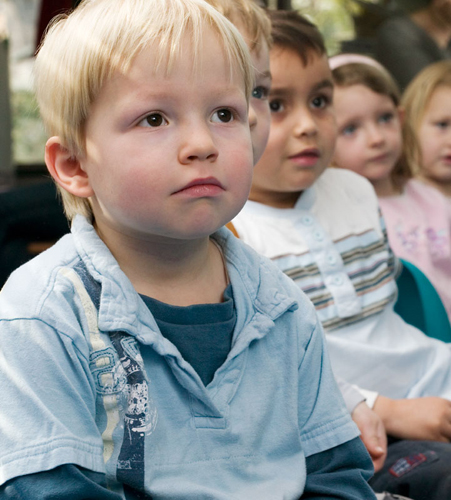Thankfully, year 3–4 can sometimes feel like the calm
after the storm for parents. Your toddler will still be having tantrums
and testing limits, but with her newfound understanding of what’s right
and what’s not, she will be eager to do things correctly in order to
win your approval.
“Rebecca is developing a very loving nature and shows great concern if anyone is upset.”
—“Rebecca is developing a very loving nature and shows great concern if anyone is upset.”
Your child enjoys
more structured play and activities now and will be much more
achievement-oriented because she craves your approval. Your positive
regard will, in turn, help her to develop self-esteem.
An awareness of others
Your child will now understand how his behavior affects the people
around him and he will generally be more settled in the company of
others.

Tuning in to others
Now that your child can
empathize with others, she will also start to develop her ability to
understand that someone else may see things differently than her. This
is an important and necessary part of learning to develop friendships
and later social relationships. Psychologists call it “theory of mind.”
It is the skill that enables us to learn to empathize with, understand,
and predict the behavior of others.
Your child starts to
understand that she is a separate person with separate thoughts when she
develops the ability to share attention with another person; for
example, when she understands that someone else is sharing her interest
by looking in the same direction and pointing .
This leads to her developing a more sophisticated understanding of the
mental state (thoughts and feelings) of others, which coincides with her
becoming more concerned with the feelings of others and more aware of
her own behavior.
She may begin to ask lots
of “Why?” questions as she tries to make sense of the world. During year
3–4, she will progress from being able to hold two different
perspectives, but only one at a time, to being able to hold in mind two
(or more) perspectives simultaneously. This skill is encouraged each
time you help your child share with others and explain why people act or
feel a certain way. Your child will become much more aware and
observant of how other people behave at this age. Help her to learn by
giving clear and concise answers when she asks “Why?” questions about
other people’s needs and feelings.
A sense of identity
Your child’s sense of
identity began to develop during her first year, when she recognized,
for example, that her hand belonged to her. Gradually, through her daily
experiences and interaction with other people, she is increasing her
sense of self.
By the age of 3–4, she knows:
Your child is unlikely
to describe herself in terms of her personality at this age, but she is
starting to learn that there is a difference between her private self
and herself as others see her: her public self. She is too young to hold
beliefs or personal ideals about self-image or identity. Views about
how she should ideally behave or act will develop later, when she
becomes an adolescent. At this age self-identity is developed in the
following ways:
The difference between her physical self (“I am brown-haired, I am dark skinned, and I have brown eyes”), and…
Her psychological self (“I am funny/smart/sassy”).
How she is related to other people and what she can do (“I am my mother’s daughter and I can run fast”).
Other people’s reactions
Your reaction to your
child tells her what your expectations are of her behavior, her
achievements, and her beliefs. You are the mirror through which your
child views herself. The more judgmental you are toward her, the harsher
she will be on herself.
Comparing self with others
Comparing who we are
and what we have with others begins at quite a young age. Children tend
to make comparisons based on physical attributes and belongings. They
can be quite jealous of others (and harsh on themselves). Your child
needs you to help keep comparisons in perspective and teach her the
qualities that you and others value.
Imitation
Children naturally
identify with significant others in their life and use them as role
models. Role-play is an important part of development at this age,
although encouraging your child to have confidence in her views and
choices can help her to begin to think for herself and not always
“follow the pack.”
Development of self-esteem
Self-esteem is drawn from a
sense of “fitting in” and understanding society’s rules and
expectations, and is linked to a sense of self-awareness of gender and
personal expectations of life. People with high self-esteem tend not to
reflect everything that happens back on themselves. They do not consider
external events to be their “fault” and have some belief in their
ability to influence or control the outcome of events.
If you can foster
these skills in your child from a young age, she is more likely to grow
up with a strong sense of self-esteem. Children with high self-esteem
have high expectations of themselves and are therefore more likely to
achieve more highly; this in turn feeds self-esteem. You can foster
self-esteem by encouraging your child to make her own decisions,
praising when praise is due, and ensuring you allow her to make things
up to you if you have needed to criticize her behavior.
Self-awareness
She now recognizes herself as a complete individual and begins to
understand that she—and her behavior—is sometimes judged by others,
especially you.

Your toddler’s view of the world
Here’s an insight into what your toddler might be thinking…
“I am not a boy! I am a girl, and sometimes I am a fairytale princess.”
“I try to be good because that makes Mommy and Daddy happy and I get an extra story at bedtime.”
“When
Mommy and Daddy go to work I go to Grandma’s. I love my grandma and I
dress up in her party dress and hat. I know Mommy will come and get me
after I’ve had my dinner. They say they will come at 7 o’clock, but I
can’t tell the time.”
“Sometimes I see monsters in my bedroom, but they go away when Mommy puts the light on. Daddy says they are called ‘shadows’.”
“I
have a friend named ‘Tina’ who goes everywhere with me. We have pretend
adventures and then she is a princess, too. Sometimes Mommy and Daddy
talk to her, and I tell them Tina did things which I actually did so I
don’t get in trouble.”
“Sometimes I brush my teeth if Mommy’s with me, but I only like the toothpaste, really.”
“I like dressing myself now. I use the big toilet now, too.”